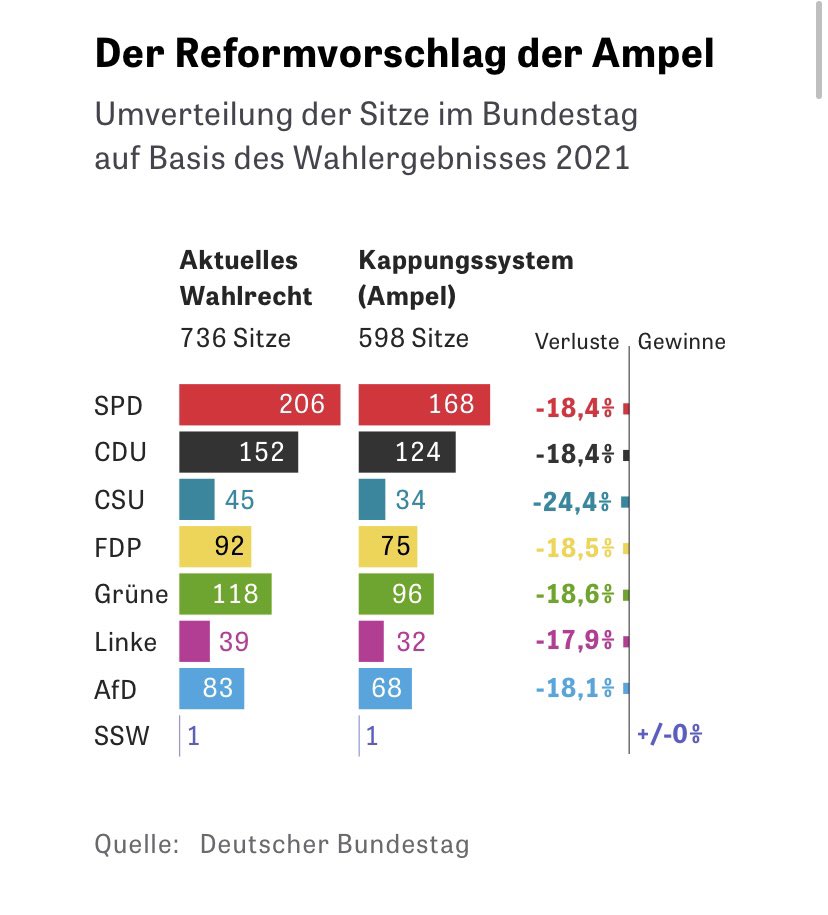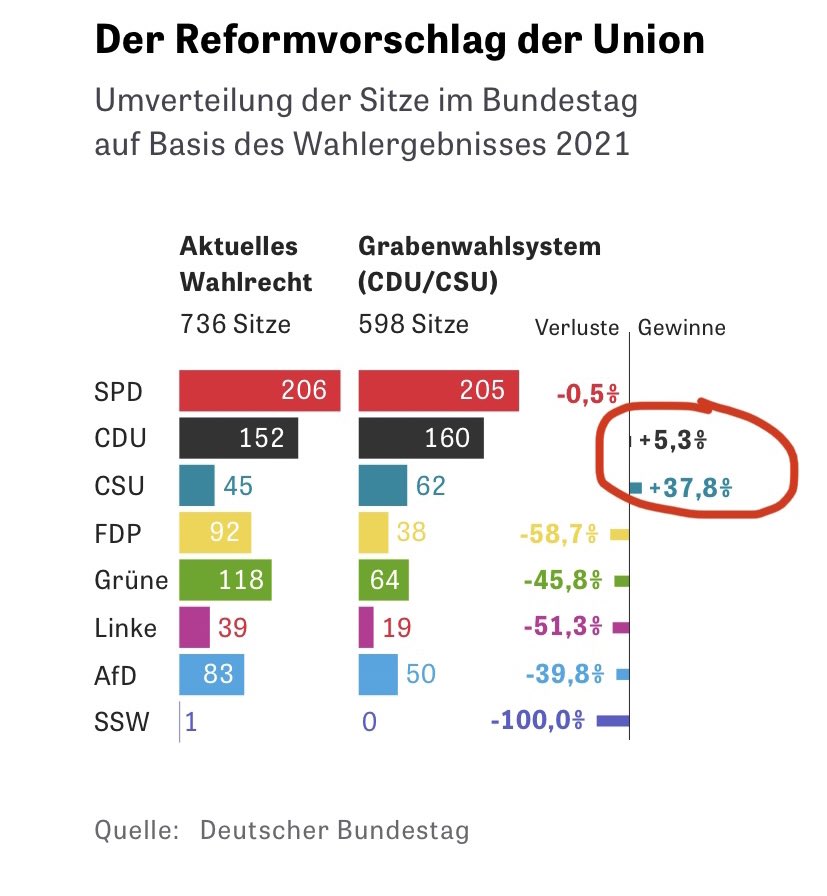Over the last few days, I have been involved in some heated Twitter discussions around a possible reform of the voting system for the German parliament. Those have sharpened my understanding of one or two things and that's why I think it's worthwhile writing a blog post about it.
The root of the problem is that the system currently in use tries to optimise two goals which are not necessarily compatible: Proportional representation (number of seats for a party should be proportional to votes received) and local representation (each constituency being represented by at least one MP). If you only wanted to optimise the first you would not have constituencies but collect all votes in one big bucket and assign seats accordingly to the competing parties, if you only wanted to optimise the second goal you would use a first past the pole (FPTP) voting system like in the UK or the US.
In a nutshell (glancing over some additional complications), the current system is as follows: We start by assuming there are twice as many seats in parliament as there are constituencies. Each voter has two different votes. The first is a FPTP vote that determines a local candidate that will definitely get a seat in parliament. The second vote is the proportional vote that determines the percentage of seats for the parties. The parties will then send further MPs to reach their allocated lot but the winners of the constituencies are counted as well and the parties only "fill up" the remaining seats from their party list. So far so good, you have achieved both goals: There is one winner MP from each constituency and the parties have seats proportional to the number of (second) votes. Great.
Well, except if a party wins more constituencies than they are assigned seats according to proportional votes. This was not so much of a problem some decades ago when there were two major parties (conservative and social democrat) and one or two smaller ones. The two parties would somehow share the constituency wins but since those make up only half of the total number of seats those would not be many more than their share to total seats (which would typically be well above 30% or even 40%).
The voting system's solution to this problem is to increase the total number of seats to the minimal total number such that each party's number of won constituencies is at least as high as their shore of total seats according to proportional vote.
But these days, the two former big parties have lost a lot of their support (winning only 20-25% in the last election) and four additional parties being also represented and not getting much less votes than the two former big ones. In the constituencies it is not rare that you win your FPTP seat with less than 30% of the votes in the constituency and it the last election it can be as low as only 18% sufficient to being the winner of a seat. This lead to the parliament having 736 seats as compared to the nominal size of 598 and there were polls not long before that election which suggested 800+ seats or possibly even over 1000.
A particular case is the CSU, the conservative party here in Bavaria (which is nominally a different party from the CDU, which is the conservative party in the rest of Germany. In Bavaria, the CDU is not competing while in the rest of the country, the CSU is not on the ballot): Still being relative winners here, they won all but one constituencies but got only about 30% of the votes in Bavaria which translates to slightly above 5% of all votes in Germany.
According to a general sentiment, 700+ seats is far too big (for a functioning parliament and also cost wise), so the system should be reformed. But people differ on how to reform it. A simple solution mathematically would be to increase the size of the constituencies to decrease their total number. So the total number of constituency winners to be matched by proportional votes would be less. But that solution is not very popular with the main argument being that those constituents would be too big for a reasonable contact of the local MPs to their constituents. Another likely reason nobody really likes to talk about is that by redrawing district lines by a lot would probably cause a lot of infighting in all the parties because the candidatures would have to be completely redistributed with many established candidates losing their job. So that is off the table, after all, it's the parties in parliament which decide about the voting system by simple majority (with boundary conditions set by relatively vague rules set by the constitution).
There is now a proposal by the governing social democrat-green-liberal coalition. The main idea is to weaken the FPTP system in the constituencies maintaining the proportional vote: Winning a constituency no longer guarantees you a seat in parliament. If you party wins more constituencies than their share of total seats according to the proportional votes, those constituency seats where the party's relative majority was the smallest would be allocated to the runner up (as that candidates party still has to be allocated seats according to proportional vote). This breaks FPTP, but keeps the proportional representation as well as the principle of each constituency sending at least one MP while fixing the total number of seats in parliament to the magic 598.
The conservatives in opposition do not like this idea (been traditionally the relatively strongest parties and thus tending to win more constituencies). You can calculate how many seats each party would get assuming the last election's votes: All parties would have to give up about 18% of their seats except for the CSU, the Bavarian conservatives, who would lose about 25% since some fine print I did not explain so far favours parties winning relatively many constituencies directly.
The conservatives also have a proposal. They are willing to give up proportionality in favour of maintaining FPTP and fixing the number of seats to 598: They propose to assign 299 of the seats according to FPTP to constituency winners and only distributing the remaining 299 seats proportionally. So they don't want to include the constituency winners in the proportional calculation.
This is the starting point of the Twitter discussions. Both sides accusing the other side have an undemocratic proposal. One side says a parliament where the majorities do not necessarily (and with current data) unlikely represent majorities in the population is not democratic while the other side arguing that denying a seat to a candidate that won his/her constituency (even by a small relative majority) being not democratic.
Of course it is a total coincidence that each side is arguing for the system that would be better for them (the governing coalition hurting everybody almost equally only the CSU a bit more while the conservative proposal actually benefitting the conservatives quite a bit while in particular hurting the smaller parties that do not win many constituencies or none at all).
(Ampel being the governing coalition, Union being the conservative parties).
Of course, both proposals are in a mathematical sense "democratic" each in their own logic emphasising different legitimate aspects (accurate proportional representation vs accurate representation of local winners).
Beyond the understandable preference for a system that favours one's own political side I think a more honest discussion would be about which of these legitimate aspects is actually more relevant for the political discourse. If a lot of debates would be along geographic lines, north against south, east against west or even rural vs urban then yes, it is very important that the local entities are as accurately represented as possible to get the outcomes of these debates right. That would emphasise FPTP as making sure local communities are most honestly represented.
If however typical debates are along other fault lines, for example progressive vs conservative or pro business vs pro social wealth redistribution then we should make sure the views of the population are optimally represented. And that would be in favour of a strict proportional representation.
Guess what I think is actually the case.
All that in addition to a political tradition in which "calling your local MP or representative" is a much less common thing that in anglo-saxon countries and studies showing that even shortly after a general election less than a quarter of the voters being able to name at least two of the names of their constituency's candidates casting serious doubts about an informed decision at the local level rather than along party lines (where parties being only needed to make sure there is only one candidate per party in the FPTP system while being the central entity for proportional votes).
PS: The governing coalition's proposal has some ambiguities as well (as I demonstrate here --- in German).





No comments:
Post a Comment